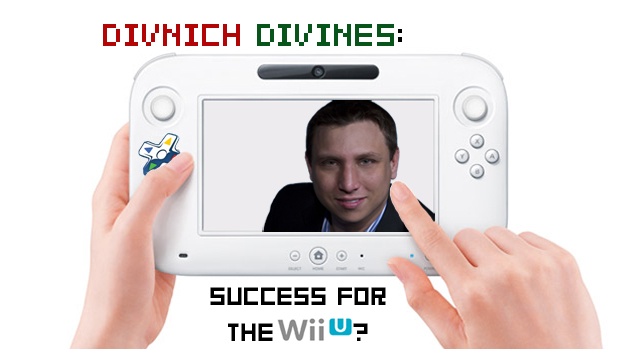[In Divnich Divines, EEDAR Vice President and videogame analyst Jesse Divnich traverses the bogs of sales data, hype, and good old fashioned game geekery to give you his two cents on hot topics in the game industry]
Despite months of concept art “leaks” and other rumors surrounding Nintendo’s Project Café, the gaming juggernaut was still able to catch us off guard with its Wii U announcement at E3. But will the Wii U offer enough for “core” gamers, who perhaps already own an Xbox 360 or PS3 to fulfill their HD console needs?
In this new regular feature on Destructoid, I poll Jesse Divnich for his analyst perspective on current and ongoing developments in the game industry. With the initial skepticism of a multiple console owning gamer in mind, this edition’s question is: “What will it take for the Wii U to become a commercial success at this stage of the console generation lifecycle?“

Divnich: “The Wii offered a completely different style of interactive entertainment versus the traditional consoles, which leads me to consider that the Wii was never a part of the “7th Generation” of consoles. I’d argue that very few consumers ever had to decide between an Xbox 360, PlayStation 3, or Nintendo Wii; rather, it was an HD experience (Xbox 360 or PS3) vs. the Wii. Just looking at the top selling Wii games makes it clear that the Wii truly offered a differential experience, since 90% of those titles can only be experienced on the Wii.
“Now this is not to say that the Wii wasn’t a ‘core’ platform, since any true core gamer owns a Wii in addition to at least one HD console [By which Divnich means to say that most core gamers can admit to enjoying a casual gaming experience, and it’s likely one of the reasons why a lot of traditional gamers own a Wii (see the comments section) — Ed.], but we have to admit the expectation of experience on the Wii is vastly different than what one would expect on the HD consoles.
“I would caution Nintendo to stray from labeling the Wii U as a platform that delivers a core experience as its primary function. It just doesn’t need to compete with the Xbox 360 or PlayStation 3 when they’ve already carved out a rather large niche market for themselves.
“The problem with the Wii U is that the platform will offer the capability of delivering a traditional HD experience, and it may give publishers an ‘easy out’ from having to create a truly differential experience.”

“My biggest fear is that third-party publishers will simply ‘port’ their PS3 and Xbox 360 library over to the Wii U, while adding minimal unique features to the Wii U version. Simply put, I don’t think the core community will fall for it and no one can honestly say they would purchase Assassin’s Creed III for the Wii U, when they’ve already built a strong loyalty to the series on another platform. If someone told me they own every console and have purchased every Assassin’s Creed iteration, I can bet with a high degree of certainty they likely own all iterations for the same console.
“Third-party publishers underperformed on the Wii and it took them years to finally figure out that even though the vast majority of the core community owned a Wii, we didn’t want a traditional core experience. The divergence in the technology created this disparity in desired experiences. The same is true for the iPhone.
“Our data shows that over 55% of Xbox 360 consumers who play more than 10 hours a week of core gaming are also engaged in the mobile markets, yet when we look at the top-selling iOS titles, they are all casual or bite-sized experiences that would only be enjoyable on the iOS devices due to the specific technology inherent to the platform (touch screen, etc.).”

“The idea that the ‘core’ or ‘casual’ classification of a gamer is static is ridiculous. When I go to the theater, the movie I watch depends entirely on the experience I am looking to enjoy. If I am with a group of guys, we want to see something with high octane action; when I am with my wife, a romantic comedy. I believe consumers act similarly with video games.
“I am not suggesting that core ports to the Wii U will be unprofitable since the costs of porting, plus minimal Wii U integration, is likely minimal; however, what I am suggesting is that core ports have minimal reward and with our industry being risk adverse, I fear that publishers would rather make a sure penny over a potential dollar. Two years from now, when we look at the top 25 best-selling Wii U titles, I have no doubt that 90% of them will be unique in some fashion to the Wii U.
“The Wii U will be a successful platform. The question remains, however, aside from Nintendo, who else will be rolling in the profits? My guess, the ones that take full advantage of the differentiating Wii U technology.”
When the Wii was first announced, many of us may have rolled our eyes but we still had slivers of hope for truly novel and unique gaming experiences. We’ve seen a few great games on the Wii that made good on this promise, like Zack & Wiki, although the Wii will never be remembered for its huge lineup of amazing games that absolutely required motion controls. Let’s hope third-party developers and publishers will learn from the best and most creative titles the Wii library has to offer, and that they will apply those lessons when developing for the Wii U.
Not that anyone will care about shovelware and shoddy ports once an HD Zelda or Mario game is announced, of course.


